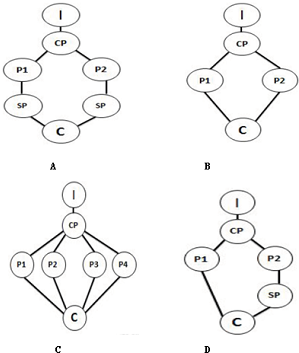早教吧作业答案频道 -->英语-->
TheU.S.PostalService(USPS)islosingbillionsofdollarsayear.Thegovernmentcompanythatdelivers"smallmail"islosingouttoemailandothertypesofelectroniccommunication.First-classmailamountfellfromahighpoin
题目详情
The U.S.Postal Service (USPS) is losing billions of dollars a year.The government company that delive rs"small mail"is losing out to email and other types of electronic communication.First-class mail amount fell from a high point of 104 million pieces in 2000 to just 64 million pieces by 2015.
Congress permits the 600.000-employee USPS to hold a monopoly (垄断) over first-class and standard mail.The company pays no federal,state or local taxes; pays no vehicle fees; and is free from many regulations on other businesses.Despite these advantages,the USPS has lost $52 billion since 2007,and will continue losing money without major reforms.
The problem is that Congress is preventing the USPS from reducing costs as its sales decline,and is blocking efforts to end Saturday service and close unneeded post office locations.USPS also has a costly union-dominated workforce that slows the introduction of new ideas or methods down.USPS workers earn significantly higher payment than comparable private-sector workers.The answer is to privatize the USPS and open postal markets to competition.With the rise of the Internet,the argument that mail is a natural monopoly that needs government protection is weaker than ever.
Other countries facing declining letter amounts have made reforms.Germany and the Netherlands privatized their national postal companies over a decade ago,and other European countries have followed suit.Britain floated shares of the Royal Mail on its stock exchange in 2013.Some countries,such us Sweden and New Zealand,h ave not privatized their national postal companies,but they have opened them up to competition.
These reforms have driven efficiency improvements in all of these countries.Additional number of workers have been reduced,productivity has risen and consumers have benefited.Also,note that cost-cutting measures-such as closing tone post offices-are good for both the economy and the environment.
Privatization and competition also encourage new changes.When the USPS monopoly over"extremely urgent"mail was stopped in 1979,we saw an explosion in efficient overnight private delivery by firms such as FedEx.
The government needs to wake up to changing technology,study postal reforms abroad and let businessmen reinvent our out-of-date postal system.
62.What do we know about the USPS?___
A.Its great competitor is the delivery firm FedEx.
B.It is an old public service open to competitions.
C.Its employees don't pay federal,state or local taxes.
D.It has complete control of first-class and standard mail.
63.The author mentions some other countries in Paragraph 4 to___.
A.explain the procedures of reform to the USPS
B.show the advantages of private postal services
C.set some examples for the government to learn from
D.prove the situation is very common around the world
64.The author probably agree that the USPS___.
A.needs government's protection as ever
B.can work together with other businesses
C.must be replaced by international companies
D.should be sold out and become a private service
65.Which of the following shows the development of ideas in this passage?___

( I:Introduction CP:Central point P:Point Sp:Sub-point (次要点) C:Conclusion)
Congress permits the 600.000-employee USPS to hold a monopoly (垄断) over first-class and standard mail.The company pays no federal,state or local taxes; pays no vehicle fees; and is free from many regulations on other businesses.Despite these advantages,the USPS has lost $52 billion since 2007,and will continue losing money without major reforms.
The problem is that Congress is preventing the USPS from reducing costs as its sales decline,and is blocking efforts to end Saturday service and close unneeded post office locations.USPS also has a costly union-dominated workforce that slows the introduction of new ideas or methods down.USPS workers earn significantly higher payment than comparable private-sector workers.The answer is to privatize the USPS and open postal markets to competition.With the rise of the Internet,the argument that mail is a natural monopoly that needs government protection is weaker than ever.
Other countries facing declining letter amounts have made reforms.Germany and the Netherlands privatized their national postal companies over a decade ago,and other European countries have followed suit.Britain floated shares of the Royal Mail on its stock exchange in 2013.Some countries,such us Sweden and New Zealand,h ave not privatized their national postal companies,but they have opened them up to competition.
These reforms have driven efficiency improvements in all of these countries.Additional number of workers have been reduced,productivity has risen and consumers have benefited.Also,note that cost-cutting measures-such as closing tone post offices-are good for both the economy and the environment.
Privatization and competition also encourage new changes.When the USPS monopoly over"extremely urgent"mail was stopped in 1979,we saw an explosion in efficient overnight private delivery by firms such as FedEx.
The government needs to wake up to changing technology,study postal reforms abroad and let businessmen reinvent our out-of-date postal system.
62.What do we know about the USPS?___
A.Its great competitor is the delivery firm FedEx.
B.It is an old public service open to competitions.
C.Its employees don't pay federal,state or local taxes.
D.It has complete control of first-class and standard mail.
63.The author mentions some other countries in Paragraph 4 to___.
A.explain the procedures of reform to the USPS
B.show the advantages of private postal services
C.set some examples for the government to learn from
D.prove the situation is very common around the world
64.The author probably agree that the USPS___.
A.needs government's protection as ever
B.can work together with other businesses
C.must be replaced by international companies
D.should be sold out and become a private service
65.Which of the following shows the development of ideas in this passage?___

( I:Introduction CP:Central point P:Point Sp:Sub-point (次要点) C:Conclusion)
▼优质解答
答案和解析
62-65.DCDB
62.D 细节理解题.根据第二段第一句Congress permits the 600.000-empIoyee USPS to hold a monopoly (垄断) over first-class and standard mail.国会允许有60万员工的美国邮政管理局对一流的和标准的邮件占据垄断地位.故选D.
63.C 写作意图题.第四段写到其他遇到相同问题的国家都是如何解决的,以此可以推断出是希望"政府看到这些例子并效仿.故选C.
64.D 观点态度题.文章第四段中,作者认为解决美国邮政服务的问题,政府应该向这些国家学习,那么可推理出这些国家的做法是作者认可的,这些国家的做法可总结为两种:私有化和脱离政府的庇护进入竞争市场.因此答案是D.
65.B 文章结构题.全文一共七段,第一段和第二段是背景信息,属于Introduction(介绍),第三段属于Central point(中心论点),第四、五段是第一个论点(P1),第六段是第二个论点(P2),第七段进行总结属于Conclusion.故本题答案为B选项.
62.D 细节理解题.根据第二段第一句Congress permits the 600.000-empIoyee USPS to hold a monopoly (垄断) over first-class and standard mail.国会允许有60万员工的美国邮政管理局对一流的和标准的邮件占据垄断地位.故选D.
63.C 写作意图题.第四段写到其他遇到相同问题的国家都是如何解决的,以此可以推断出是希望"政府看到这些例子并效仿.故选C.
64.D 观点态度题.文章第四段中,作者认为解决美国邮政服务的问题,政府应该向这些国家学习,那么可推理出这些国家的做法是作者认可的,这些国家的做法可总结为两种:私有化和脱离政府的庇护进入竞争市场.因此答案是D.
65.B 文章结构题.全文一共七段,第一段和第二段是背景信息,属于Introduction(介绍),第三段属于Central point(中心论点),第四、五段是第一个论点(P1),第六段是第二个论点(P2),第七段进行总结属于Conclusion.故本题答案为B选项.
看了TheU.S.PostalSe...的网友还看了以下:
英语达.请把下列个题中的字母组成一个你所学过的单词.o,m,w,l,c,e,ee,g,h,t,io 2020-05-13 …
e,m,o,n,t,h能组合出什么单词? 2020-05-14 …
英语单词辨音找出画()部分读音与其余不同的单词()1.A .kn(ee) B.n(e)ck C.r 2020-05-17 …
将字母组成单词,并译成汉语1.m,e,r,m,u,s,汉语2.u,l,t,e,c,u,r,汉语3. 2020-06-04 …
重新排列字母,写出单词1.s,a,p,e,c,2.r,o,e,t,c,k,3.d,c,o,o,t, 2020-06-06 …
下列各题中加下划线字的注音全都正确的一项是A.鞭挞tà叨光tāo体已tī孝悌tìB.殷红yīn奶酪 2020-07-02 …
下列各题中黑体加点字的注音全都正确的一项是A.鞭挞tà叨光tāo体已tī孝悌tìB.殷红yīn奶酪 2020-07-02 …
谁会用下列字母组成三个英语单词???g,a,l,o,ts,t,o,a,o,ha,s,f,t,ks,h 2020-11-01 …
9个字母,已知有:c,o,t,l,n,u,o无顺序.是什么单词啊.急还有1个i,还有e,总共是:c, 2020-12-05 …
英文单词分类填空动物类1.O()t()p()s2.k()t()e()3.l()b()t()r4.a( 2021-02-05 …